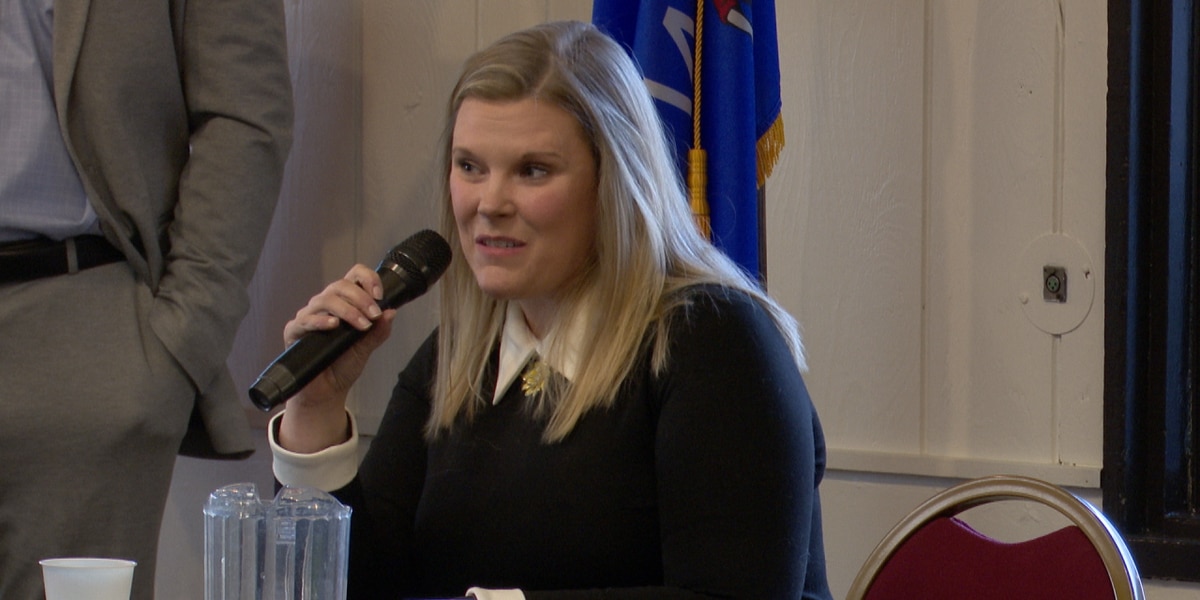Reappointment vote ends in partisan deadlock for battleground Wisconsin’s top elections official

MADISON, Wis. (AP) — A vote on the future of Wisconsin’s top elections official ended in partisan deadlock Tuesday amid Republican calls for the nonpartisan administrator of the statewide elections commission to resign over how she ran the 2020 presidential contest.
A stalemate between elections commissioners on whether to reappoint Meagan Wolfe creates uncertainty over who will be in charge of elections in a battleground state so narrowly divided that four of the past six presidential elections in Wisconsin have been decided by less than a percentage point. Wolfe has staunchly defended the decisions she’s made and fought back against false claims of election fraud, including those made by former President Donald Trump.
“When your constituents challenge you about the integrity of Wisconsin elections, tell them the truth,” she wrote to lawmakers just days before the vote on her reappointment. “When people perpetuate false claims about our election systems, push back publicly. Election officials cannot carry the burden of educating the public on elections alone.”
The six members of the Wisconsin Elections Commission are evenly divided between Republicans and Democrats. Republican commissioners voted to reappoint Wolfe, but Democrats abstained from Tuesday’s vote for fear that reappointing her would allow the Republican-controlled state Senate to reject her confirmation. Commission actions require at least a four-vote majority.
“Meagan Wolfe is the best person to run our agency, and that’s why I’m abstaining. I will take my shots with the court rather than at the Senate,” Democratic Commissioner Mark Thomsen said.
The impasse means it could be months before commissioners or lawmakers choose someone to lead the elections agency through the 2024 presidential race and beyond, if they do so at all.
A recent Wisconsin Supreme Court ruling appears to allow Wolfe to continue as administrator, even after her term ends on Saturday. But relying on that decision, which has allowed Republican appointees to stay on state boards, raises unanswered legal questions.
“We are in unprecedented territory,” Wolfe said at a news conference after the vote. “I have a very clear intent here, and that is to make sure that our commission, our agency, our local election officials, that they have the stability they need as we move forward.”
Commission Chair Don Millis, a Republican, warned that having a holdover administrator would only decrease stability by encouraging conspiracy theorists and drawing questions about Wolfe’s authority during the 2024 election.
“It’s more than a bad look. It’s going to create problems for us and for elections officials across the state,” he said.
Wolfe has served as the state’s elections administrator since 2018 and has become one of the most respected elections leaders in the nation. Before defending her record in a letter to state lawmakers, she called on commissioners to vote for the option they believe offers the most stability for Wisconsin elections even if that’s not her.
If the commission eventually appoints Wolfe or someone else to replace her, they will need to be confirmed by the Republican-controlled state Senate.
Some Republican state senators have vowed to vote against reappointing Wolfe, who has sparred with them over election conspiracy theories on numerous occasions. If a commission appointee is rejected by the Senate, then commissioners would need to make a new appointment within 45 days or else a legislative committee controlled by Republicans could choose the next administrator.
Relatively few people meet the legal requirements or hold the experience necessary to serve as Wisconsin’s top elections official. An appointee for elections administrator cannot have ever worked in a partisan office or donated to a partisan campaign in the past year, and the state’s elections system is one of the most decentralized in the country.
The commission’s vote comes as a divided GOP struggles to move past election lies that Trump and his followers have promoted since his loss to President Joe Biden in 2020. Republican state lawmakers across the country have sought to expand their control over elections in recent years, and far-right candidates have won seats in local government with platforms built on election skepticism.
But by and large, election denialism has hurt the GOP. Most candidates in 2022 in swing states including Wisconsin who supported overturning Trump’s defeat lost. A draft Republican National Committee report obtained by The Associated Press earlier this year reviewing the party’s performance in recent elections called for candidates to stop ” relitigating previous elections.”
In Wisconsin, the outcome of the 2020 election has withstood two partial recounts, a nonpartisan audit, a conservative law firm’s review, numerous state and federal lawsuits, and a Republican-ordered review that found no evidence of widespread fraud before the investigator was fired. The GOP-controlled Legislature has rejected attempts to decertify the results.
Copyright 2023 The Associated Press. All rights reserved.


